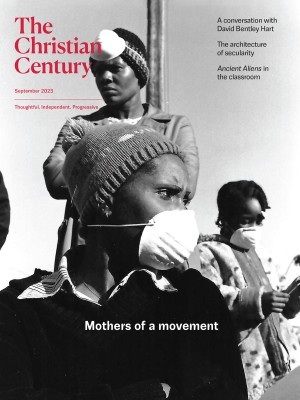Earth martyrs
Elizabeth O’Donnell Gandolfo makes readers question the depth of their own commitment to righteousness.
It’s hard not to feel complicit when we contemplate our next grocery run. The convenient items and ingredients for our favorite dishes are paid for with an unfathomable price. The produce section’s fruits and vegetables make those who pick them sick because of the pesticides. The cars that carry our groceries home run on precious metals that are attained by exhausting local water supplies. Is the contemplation of our complicity enough, or do we need to do more?
Elizabeth O’Donnell Gandolfo’s new book will make readers question the depth of their own commitment to righteousness. Gandolfo, a Catholic theologian who teaches at Wake Forest University School of Divinity, tells the stories of several ecomartyrs—people who were killed because they advocated for kinder stewardship of the earth and its resources—and contextualizes their work theologically.
Read our latest issue or browse back issues.
Ecomartyrdom is not a new phenomenon. Gandolfo draws a direct line from the colonialism of the past to capitalist extractivism in the present. She finds in these oppressive systems a laser focus on exploitation, often with impunity, and little regard for the bodies crushed along the way. Alarmingly, she notes that “since 2002 alone, Global Witness has documented over 2,200 environmental defenders who have been assassinated” and “at least three people a week are killed protecting our environmental rights.”
These statistics sound absurd, but they fit with what we observe around us every day: the priority of profit over people, to the point that human beings are treated as mere objects. As I was reading this book, I kept imagining the martyrs of Revelation who cry out from under the altar, “Sovereign Lord, holy and true, how long will it be before you judge and avenge our blood on the inhabitants of the earth?” (Rev. 6:10).
Consider the witness of Sister Dorothy Mae Stang. A native Ohioan who ministered in Brazil, she spoke truth to land-grabbers, advocated for the rights of poor farmers, and fought for the preservation of the Amazon rainforest. I’m struck by Gandolfo’s account of Stang’s assassination, which was orchestrated by a wealthy rancher. Approached by a group of gunmen, Stang spent her last moments on this side of eternity reading to them from the Beatitudes. Blessed are the peacemakers.
Or the witness of Father Alcides Jiménez, a Colombian priest who articulated the immanence of Christ as present in creation. Jiménez’s life witnessed against understandings of creation as something to dominate. While the local land was being destroyed by oil extraction and monoculture coca cultivation, he pointed toward another way. He often held mass outdoors, helping his congregants envision a life where humanity dwells with creation and glorifies God with the tender care of the earth. Such a vision is scandalous when contrasted with the ways of the world. Jiménez was gunned down while celebrating the Eucharist.
Theology is at its best when it centers the margins, and Gandolfo’s book is an excellent addition to a prophetic legacy pleading for the interruption of extractivism. The convenience we enjoy costs too much if the price is the health and welfare of others. We are living too shortsightedly if our enjoyment of the earth’s spoils does not take into account the long-term detriment of creation.
Ecomartyrdom in the Americas is convicting for those of us who strive to adjust our life’s settings between prophecy and comfort. Gandolfo reminds us that “on the consumer side of things, there is no product that must not be held in some suspicion, no purchase that is not suspect, no consumer whose hands are clean. We are all complicit.” These ecomartyrs gave their lives to show us there is another way.







